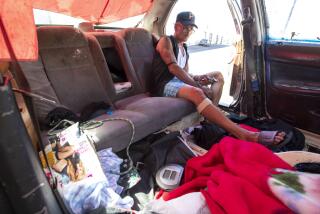Vet Brings Viet Daughter Home
- Share via
SAN FRANCISCO — Saying “I always believed I would see this day,” Vietnam veteran Barry Huntoon returned home Tuesday with his teen-aged Amerasian daughter, ending a two-year bureaucratic nightmare that began when he spotted her photograph in a magazine.
“It was a long haul. I don’t think she’d be here now if I hadn’t gone to Vietnam personally to get her,” Huntoon said as he and his daughter hugged and kissed his wife, Laura, and 3-month-old baby at a tearful airport homecoming. “It’s much harder to listen to paper work and much easier to listen to a person.”
Tears streaming down her cheeks and a look of bewilderment on her face, 15-year-old Tran Thi Tuyet Mai clung tightly to her father’s hand as more than two dozen reporters and cameramen surrounded them at San Francisco International Airport. “I’m very, very happy to be here with my family,” she said through an interpreter.
Huntoon, 38, a former Army medic from Paradise, Calif., said the cotton jump suit, navy blue sweat shirt and Nike sneakers worn by his daughter were “the first new clothes she’d ever had in her life.” He bought the outfit in Bangkok, where the girl had been taken after her father met her in Ho Chi Minh City (formerly Saigon) on Monday.
Huntoon, now a sales representative for a water purification firm, left behind his Vietnamese girlfriend, nine months pregnant with Mai, upon completing a tour of duty in Vietnam in 1972. They didn’t have the papers needed to get married and efforts to bring the girlfriend to the United States failed.
He lost contact with the mother and eventually a social services organization looking into the matter informed him that she was dead. All his efforts to find the baby failed.
Then, while looking at photographs of Amerasian children in the August, 1985, issue of Life magazine, Huntoon saw a girl bearing an uncanny resemblance to himself and his old girlfriend.
Convinced that the child was his daughter, Huntoon spent two years working with U.S. congressional officials, the State Department, private organizations and the Vietnamese and Thai governments to locate her and secure the necessary papers for her emigration to the United States.
When Huntoon finally traced her, Mai was eking out a living selling peanuts to Soviet tourists on the beaches of Vung Tau, near Ho Chi Minh City. The Amerasian Registry of San Jose, a private group devoted to reuniting Amerasian children with their U.S. parents, spent an estimated $30,000 to arrange for the girl’s exit from Vietnam.
She will live with Huntoon, his wife and their three young children in the family’s two-bedroom mountain home.
Mai, who already calls Huntoon “Papa,” said through the interpreter that the first thing she wanted to do in her new country is to “go to school.” Huntoon noted that like many Amerasian children, Mai had been raised poor and illiterate and had never attended school.
“Every day that goes by is another day of lost education and lost hope,” Huntoon said, expressing his anguish that more Amerasian children are not being allowed to join their fathers in the United States. “They just live to see their fathers one day. I think that’s the most important message.”
More to Read
Sign up for Essential California
The most important California stories and recommendations in your inbox every morning.
You may occasionally receive promotional content from the Los Angeles Times.









